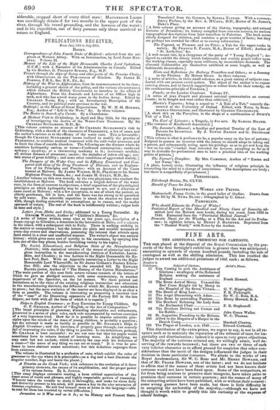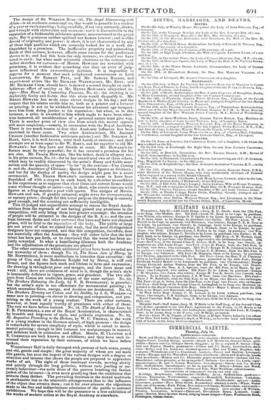FINE ARTS.
THE ADDITIONAL PREMIUMS FOR CARTOONS.
THE sum placed at the disposal of the Royal Commission by the pro- ceeds of the first fortnight's exhibition is greater than was anticipated; amounting to upwards of eleven hundred pounds, including the sale of catalogues as well as the shilling admission. This has enabled the judges to award ten additional premiums of 1001. each ; as follows. Number in
Catalogue. Subject of Cartoon. Artist's Name. 11 Una Coming to seek the Assistance of Gloriana : an allegory of the Reformed Religion seeking the assistance of England Frank Howard. 13 The Seven Acta of Mercy. Una and the Red Cross Knight led by Mercy to the Hospital of the Seven Virtues-- G. V. Rippingille. 16 The Death of King Lear F. R. Pickeragill.
31 The Angel Discoursing with Adam Sir W. C. Rosa, R.A. 45 Man Beset by contending Passions Henry Howard, R.A.
60 The Brothers Releasing the Lady from
the Enchanted Chair F. R. Stephanoff. 63 The Brothers Driving out Comas and his Rabble John Green Waller.
92 St. Augustine Preaching to the Britons W. C. Thomas. 103 Alfred in the Disguise of a Harper in the Danish Camp Marshall Claxton.
122 The Plague of London, A.D. 1349. Edward Corbould.
This distribution of the extra prizes, we regret to say, is not in all re- spects such as to maintain the reputation of the tribunal of taste for im- partiality and disirimination ; indeed it is open to very grave objections. The majority of the cartoons selected are, we willingly admit, well de- serving of the rewards bestowed ; but there are two or three of such very inferior character as to afford ground for suspicion that other con- siderations than the merit of the designs influenced the judges in their decision in these particular instances. We allude to the works of two Royal Academicians, Sir W. C. Ross and Mr. HENRY HOWARD, and that of Mr. FRANK HOWARD, son of the latter ; and we do not hesitate to affirm that if the names of these artists had not been known their cartoons would not have been fixed upon. Some of the competitors, so far from being anxious to preserve their incognito, have taken pains to proclaim their cartoons in certain quarters ; and the names of many of the com peting artists have been published, with or without their consent : some wrong guesses have been made, but there is little difficulty in in assigning the authorship of the majority,—although we have not thought it worth while to gratify this idle curiosity at the expense of others' feelings. The design of Sir WILLIAM Ross-31, The Angel Discoursing with Adam—is an academic commonplace, that would be passable in a student of a year or two's standing ; being carefully, if not very correctly, drawn, and wrought with elaboration and neatness: nor is it discreditable to the reputation of a fashionable miniature-painter, unaccustomed to the grand style. But it possesses neither spiritual nor human interest ; and is alike devoid of originality and power : in short, it is not characterized by any of those high qualities which are naturally looked for in a work dis- tinguished by a premium. The inoffensive propriety and painstaking finish of this cartoon, however, affords some excuse for the preference shown to it ; and had this been the only instance, we should not have cared to cavil : but when such miserable abortions as the cartoons—or rather sketches for cartoons—of Messrs. HOWARD are rewarded with premiums, it is evident that something else than an error of judg- ment influenced this extraordinary decision. It is impossible to suppose for a moment that such enlightened connoisseurs as Lord LANSDOWNE, Sir ROBERT PEEL, and Mr. SAMUEL ROGERS, and experienced artists like Sir RICHARD WESTMACOTT, Mr. Ern-, and Mr. RICHARD Comic, should have bestowed a second thought on such a ludicrous effort of senility as Mr. HENRY HOWARD'S allegorical de- sign—Man Beset by Contending Passions, No. 45 : the drawing is so deplorably faulty and feeble, that this alone would disqualify it. Mr. HENRY HOWARD has made some clever designs in his day ; and the respect that his talents entitle him to, both as a painter and a lecturer on painting, is not to be withheld because his advanced age incapaci- tates him from doing justice to his reputation : but when, as in this instance, a prize is awarded to him which ought to have been other- wise bestowed, all considerations of a personal nature must give way. There is another point of view also from which this matter appears still more suspicious,—namely, in connexion with the Royal Academy. There is too much reason to fear that Academic influence has been exercised in these cases. Two other Academicians, Mr. ALFRED CHALON (another fashionable miniature-painter) and Mr. SOLOMON A. HART, have, it is well known, tried their hands at cartoons ; and their attempts are at least equal to Sir W. Ross's, and far superior to old Mr. HOWARD'S : but they have not friends at court. Mr. HOWARD'S in- fluence must be very powerful ; for it has secured a premium for his son also. Mr. FRANK HOWARD, like his father, deals in allegory too : in his prize cartoon, No. 11—for he has contributed two or three others, which may be readily discovered by the artist's flimsy and feeble man- nerism and the quantity of space " to let" in the canvass—Una Corning to seek the Assistance of Gloriana ; Queen Victoria figures as Gloriana ; and but for the display of nudity the design might pass for a court ceremonial. Mr. FRANK HOWARD'S cartoons seem to have been flourished off with a crayon in each band, by a sketcher so confident in his expertness as to suppose that clear ideas and correct forms would come without thought or pains—one, in short, who covers canvass with figures as a frog mantles a pool with spawn. The designs of Messrs. HOWARD and son, if gaudily coloured, might serve for transparencies, or nursery prints ; though for this latter purpose the drawing is scarcely good enough, and the meaning not sufficiently intelligible.
This ill-judged and unjustifiable attempt to rescue the Royal Acade- micians from the reproach of not having gained any premiums in the competition, will only bring them into greater contempt : the attention of people will be attracted to the designs of the R. A. s ; and the con- trast between theirs and other cartoons that have and have not obtained prizes, will be fatal to the reputation of the body. The public at large are not aware of what we stated last week, that the most distinguished designers have not competed, and that this competition, therefore, does not materially affect the Academy : they will either infer that the best talent has been put forth, or be convinced that the worst has been un- justly rewarded. In what a humiliating dilemma both the Academy and the adjudicators of the premiums are placed !
The other cartoons to which additional prizes have been awarded are not unworthy of them ; though No. 13, The Seven Acts of Mercy, by Mr. RLPFINGILLE, is more meritorious in intention than execution : the group of Una and the Redcross Knight led by Mercy, is stiff and formal, and the figures look stark and lifeless in form and expression; the drawing is throughout poor and meagre, and the faces mean and weak: still, there are evidences of mind in it, though the artist's style F lamentably deficient in vigour, grace, and grandeur. The two sub- jects from Comas are creditable designs of the same subject. No. 60, The Brothers Releasing the Lady, by F. R. STEPHANOFF, is graceful ; but the artist's style is too effeminate for monumental painting ; in which masculine force, energy, and decision are desiderated. No. 63, The Brothers Driving out Comas and his Rabble, by J. G. WALLER—a name new to painting—is clever in drawing and composition, and pro- mising as the work of a young student. There are other cartoons, however, at least equally worthy of premiums with either of these. The rest we have before noticed. No. 16, The Death of King Lear, by F. R. PICKEBSGILL. a son of the Royal Academician, is characterized by breadth and largeness of style, and pathetic expression. No. 92, St. Augustine Preaching to the Britons, by W. C. THOMAS, is the work of a young student in the German school, of high promise : the design is remarkable for severe simplicity of style, which is suited to monu- mental painting ; though in this instance too sculpturesque in manner, and deficient both in animation and effect. Messrs. M. CLAXTON and E. CORBOULD are both known as exhibiters ; and they have each in- creased their reputation by their cartoons, of which we have before spoken.
Westminster Hall is daily thronged with persons of both sexes, young and old, gentle and simple ; the great majority of whom are not mere idle gazers, but scan the import of the various designs with a degree of attention and interest that shows the people are prepared to appreciate works of art. The sight of these continual crowds, moving slowly and quietly through the long galleries, without rude jostling or un- seemly behaviour—the satin dress of the peeress brushing the fustian jacket of the labourer—is even more gratifying than the exhibition that attracts them thither. The prevailing decorum in the mixed multitude IS attributable less to the admirable arrangements than to the influence of the object that attracts them ; nod it for ever silences the objections made to the free and indiscriminate admission of the public to national exhibitions. We hope this will be the precursor to a free exhibition of the works of modern artists at the Royal Academy or elsewhere.



























 Previous page
Previous page